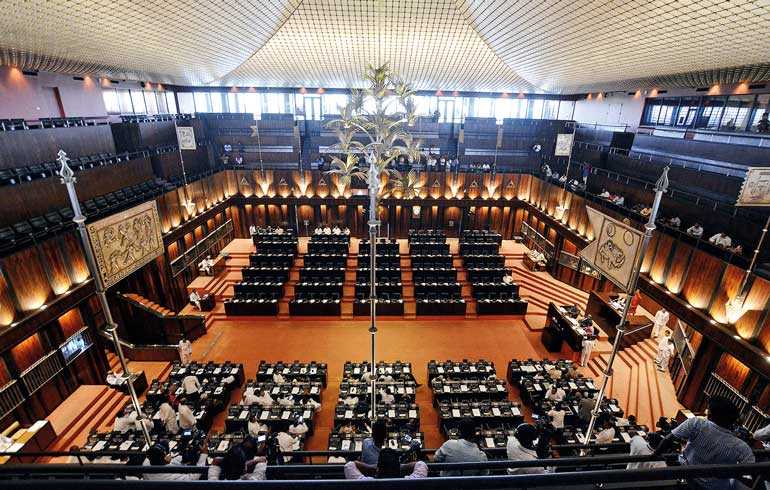Tuesday Feb 24, 2026
Tuesday Feb 24, 2026
Thursday, 27 December 2018 00:27 - - {{hitsCtrl.values.hits}}

On 18 December, China celebrated the 40th anniversary of the official launch of the Great Deng Xiaoping’s economic reforms in 1978. China’s story since then from a large, poor and communist nation to a global economic powerhouse second only to USA, is nothing less than remarkable.
Interestingly enough, it was in the same year, 1978, that Sri Lanka was introduced to the executive presidency. The path of the two countries since then, both economically and politically is an eye-opener to all Sri Lankans. 
Single party system – bedrock of China’s development
The political set up in China was very stable under the single party system. From an economic point of view, this enabled China to successfully implement an unwavering singular plan segregated into five-year objectives. This resulted in an annual average economic growth well in excess of 7% over the last several decades.
In contrast, Sri Lankan politicians kept on amending the Constitution – 19 times to be exact.
Tinkering with the Constitution – Sri Lanka’s favourite pastime
In Sri Lanka, even excluding the separatist war from 1983-2009, the political environment was unstable in nature with frequent calls for change in Constitution by various political factions for their own interests of obtaining greater power. Changes in Governments often resulted in major shifts in policy.
The political uncertainty and the absence of a singular economic plan is clearly reflected in the economic front. Not only did Sri Lanka grow at a considerably lower pace compared to the more focused and faster developing economies such as China or the Asian tiger economies, but also the lack of focus on economy meant that Sri Lanka failed to advance in the global value chain.
Executive presidency has helped Sri Lankan economy
The statistics clearly indicate that the pre-executive presidency era from 1951-1977 saw an average annual economic growth of 3.7%, while the post Executive Presidency period from 1978-2017 have witnessed a stronger annual average growth of 5.1%. This falls nicely with both the notions that Executive Presidency has strengthened political stability and greater political stability has resulted in stronger economic growth.
The global examples indicate the same message. Whether it is China or the Asian tiger economies such as Singapore and South Korea, the development through decades of high growth took place under stable (although somewhat authoritarian) political systems.
In Sri Lanka, even excluding the separatist war from 1983-2009, the political environment was unstable in nature with frequent calls for change in Constitution by various political factions for their own interests of obtaining greater power. Changes in Governments often resulted in major shifts in policy. The political uncertainty and the absence of a singular economic plan is clearly reflected in the economic front. Not only did Sri Lanka grow at a considerably lower pace compared to the more focused and faster developing economies such as China or the Asian tiger economies, but also the lack of focus on economy meant that Sri Lanka failed to advance in the global value chain
Essential change required in political set up
Let’s make no mistake. As a country that went through a separatist war for well over two decades in recent past, there is a genuine case for greater power to be devolved to the north, eastern regions. This was discussed at length over the last several decades and the 13th Amendment to the Constitution was prepared way back in 1987 with this objective.
As there is general agreement on this, the only political change that is required is the implementation of this amendment to the Constitution. Should we really waste further time discussing this over and over again?
What do the people need?
Amending the Constitution on how the power is shared, is predominantly of interest to politicians. For the people of the country, what matters is whether their quality of life improves with economic prosperity.
For example, if a sophisticated IT university is set up in the Jaffna District, the young men and women there could get world class education resulting in high income earning job opportunities. Establishing of such institutions would trickle down to other segments in the region resulting in a tangible upliftment of the local economy. Wouldn’t a person in Jaffna appreciate it more than a never-ending argument on how much power should be devolved to the region?
Further tinkering of Constitution proposed
In the abovementioned historical backdrop, with elections approaching next year, the calls for further tinkering of the Constitution are not a surprise. Already there is a 20th Amendment to the Constitution being discussed with the objective of abolishing the executive presidency.
As above statistics clearly show, the executive presidency has improved political stability and economic growth. Secondly, even if the executive presidency is abolished, it should be done simultaneous to an amendment to the composition of the Parliament. The present system results in hung parliaments with no party obtaining significant majorities, which is essential for political stability and economic growth.
Hence a meaningful discontinuation of the executive presidency (along with the composition of Parliament) would be a time-consuming, lengthy process and whether the end result would be significantly better than the present system is questionable.
In this case, the pertinent question the average citizen should ask is, “What should be priority? Should we keep changing the Constitution or should we finally focus on the economy so that the quality of life of the entire population improves?”
Agenda of politicians
A haphazard abolishing of the executive presidency would help only two. One, an individual who craves power but is unlikely to win a presidential election. Two, smaller parties who aspire to become more powerful in the Parliament by becoming the kingmakers. In the absence of an executive president, the kingmakers will be very, very powerful indeed. On the face of it, this looks like a sure recipe of further political instability and poor growth. The only beneficiaries would be the above two, mostly politicians.
To hear a prominent member of a prominent minority party saying that they do not agree with the economic ideology of the Government but would still support them due to other factors just confirms this rationale. If political alliances and governments are formed without an understanding on what the economic policy would be, it would invariably result in poor economic performance.
The annual average economic growth from 2015-2018 is under 4% and has fallen to the levels witnessed in pre-executive presidency era (1951-1977). Clearly the two party system or the Unity Government (with added checks and balances) without an agreement on economic policy, have affected the economy. This shouldn’t be a surprise really.
Would the masses be smart?
Hence, the question is clear for the masses. Should they continue to be misled by the slogans of the politicians which are predominantly for the benefit of the politicians? Or should they finally stand firm and demand the political parties to come up with a realistic, economic plan with a detailed implementation methodology and measurable goals so that performance could be evaluated continuously?
With the economy growing at around 3% (or less), there is really no time to waste. We are on the verge of a historic blunder. One could only hope the people will be smart.
(The writers can be contacted via [email protected])